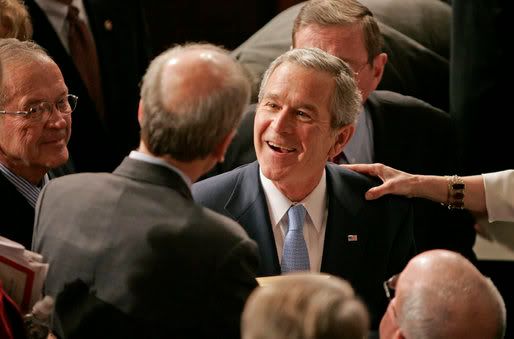
President Bush @ 2007 State of Union Address
.
.
An Except from the 2007 State of Union Address:
.
Extending hope and opportunity depends on a stable supply of energy that keeps America's economy running and America's environment clean. For too long our nation has been dependent on foreign oil. And this dependence leaves us more vulnerable to hostile regimes, and to terrorists -- who could cause huge disruptions of oil shipments, and raise the price of oil, and do great harm to our economy.
It's in our vital interest to diversify America's energy supply -- the way forward is through technology. We must continue changing the way America generates electric power, by even greater use of clean coal technology, solar and wind energy, and clean, safe nuclear power. (Applause.) We need to press on with battery research for plug-in and hybrid vehicles, and expand the use of clean diesel vehicles and biodiesel fuel. (Applause.) We must continue investing in new methods of producing ethanol -- (applause) -- using everything from wood chips to grasses, to agricultural wastes.
We made a lot of progress, thanks to good policies here in Washington and the strong response of the market. And now even more dramatic advances are within reach. Tonight, I ask Congress to join me in pursuing a great goal. Let us build on the work we've done and reduce gasoline usage in the United States by 20 percent in the next 10 years. (Applause.) When we do that we will have cut our total imports by the equivalent of three-quarters of all the oil we now import from the Middle East.
To reach this goal, we must increase the supply of alternative fuels, by setting a mandatory fuels standard to require 35 billion gallons of renewable and alternative fuels in 2017 -- and that is nearly five times the current target. (Applause.) At the same time, we need to reform and modernize fuel economy standards for cars the way we did for light trucks -- and conserve up to 8.5 billion more gallons of gasoline by 2017.
Achieving these ambitious goals will dramatically reduce our dependence on foreign oil, but it's not going to eliminate it. And so as we continue to diversify our fuel supply, we must step up domestic oil production in environmentally sensitive ways. (Applause.) And to further protect America against severe disruptions to our oil supply, I ask Congress to double the current capacity of the Strategic Petroleum Reserve. (Applause.)
America is on the verge of technological breakthroughs that will enable us to live our lives less dependent on oil. And these technologies will help us be better stewards of the environment, and they will help us to confront the serious challenge of global climate change. (Applause.)
.
.
A Response
.
If President Bush had made his State of the Union proposals on reducing this nation's dependence upon imported oil in the days following 9-11 they would most certainly have received bipartisan support, and broad public support. The President chose instead to start an unnecessary, and costly war in Iraq based upon "cooked up" intelligence. Bush's invasion of Iraq has destabilized the entire Middle East equation, leading to higher oil prices, and possible disruptions in oil supplies from that region.
The President's meager proposals come too late from his lame duck administration to constitute a serious, or sincere response to the challenges which face this nation in an age of peak oil, and global warming.
Quite simply Mr. President, your insincere talk about energy independence is nothing more than a public relations ploy, and the world knows it. Two thirds of the electorate quietly await your departure from an office you have so systematically abused.
.
.
Time's Jeffrey Klugar writes:
.
What the president didn't do after all this ambitious call to arms was put forward any serious ideas — or even any unserious ones — about how to make it happen. Remember all that talk about hydrogen cars? Get yours'yet? No, and you're not likely to for a very long time either.
All of this would be a bold call for any president, all the more so for one who came so late to the conservation game. But again, the substance is lacking, at least so far. It's one thing to call for a 20% savings in fuel; it's quite another thing to demand the hard, politically costly choices to make that happen, such as a pump tax with real bite or a significant increase in mandatory mileage standards. Bush did call generally for fuel economy improvements, but if he really wants them he doesn't have to request them; he can, for practical purposes, regulate the new rules into being. If he doesn't, it's because he doesn't want to, at least not yet.
End Snippet-
The President won't request any changes in mileage standards, and he never made any specific proposals because he isn't sincere about moving the nation away from dependence upon oil. Talk is cheap.
..
..
Credits
.
Official Caption for Photo: President George W. Bush greets people, shakes hands and signs his autograph after delivering the State of the Union Address in the House Chamber at the U.S. Capitol Tuesday, Jan. 23, 2007. White House photo by Paul Morse.
.
Time Magazine Excerpt under copyright by Time Inc 2007. Portion used under free use rules.

No comments:
Post a Comment